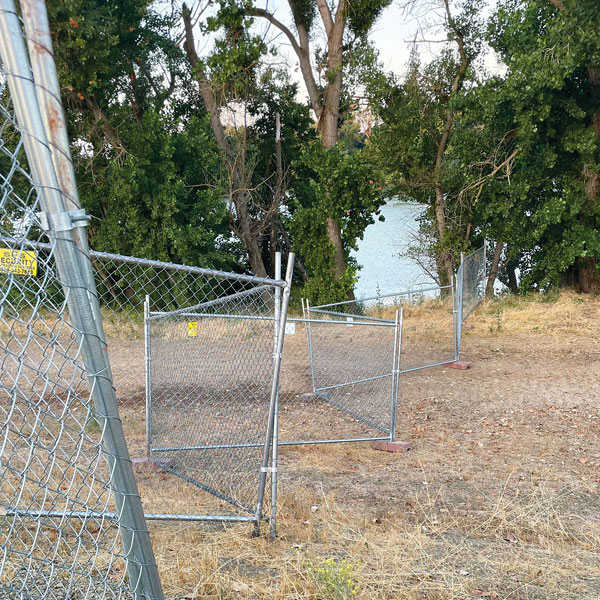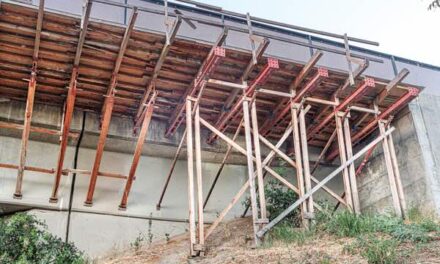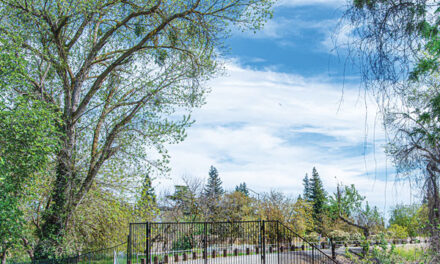Five weeks after his arrival, the new executive officer at the Central Valley Flood Protection Board appeared to ignore state law when he quietly signed three authorizations for private fences to block access to the Sacramento River Parkway and levee.
Two additional fence authorizations soon followed.
By allowing temporary fences, Christopher Lief reversed years of flood board practice and seemingly violated a California regulation that requires the board itself—not executive officer Lief—to authorize levee fences.

With his approval, Lief invited private property owners to build barriers where a state flood expert warned fences can slow emergency response and interfere with critical levee maintenance.
An investigation by Inside Sacramento found Lief ostensibly violated state law by claiming the new fences are “minor alterations.” California Code of Regulations Title 23 says all fence proposals “must be approved by the (flood) board prior to commencement of work.”
Flood board decisions require public notice and transparency. Lief signed the authorizations in private, without board approval or public awareness.
Three days after Lief issued his authorizations, private contractors erected slapdash chain-link gates and fences across the levee at sites between Garcia Bend and Zacharias parks.
Inside’s investigation indicates the authorizations are invalid, meaning the fences should be immediately removed.
Lief justified his fence authorizations in emails to Inside. He called the fences “minor alterations” and claimed they “appropriately balance the concerns of property owners, namely their desire to protect their private property from trespass.”
Yet the flood board’s own lawyer said protecting property owners from trespassers isn’t Lief’s job.
In November 2020, general counsel Jit Dua told property owners near the levee, “To the extent anyone is trespassing on your property, that’s a local law enforcement issue. It’s not a matter for the (flood) board.”
Fence authorizations did more than entangle the flood board with police business. The approvals dismissed warnings from the Department of Water Resources that fences and gates slow emergency access and impede levee maintenance.
In October 2020, flood maintenance chief Mitra Emami told the flood board, “During high water and flood events, vegetation and debris get caught in the (fences).”
She added, “Having to open and close gates during high water increases the state’s response time and limits the state’s ability to perform emergency operations.”
She said her agency “cannot endorse any encroachment permits that restrict flood maintenance or flood conveyance.”
Lief was required to obtain approval from Water Resources for his new fence authorizations. The water agency granted Lief permission but wouldn’t explain why.
A Water Resources spokesman told Inside, “DWR does not endorse encroachment permits that it finds restricts flood maintenance or flood conveyance.” The agency had no comment about the problems caused by fences and vegetation, debris and emergency response times.
The city plans to build a bike trail on the levee to connect Meadowview to Downtown. City officials cheer the trail as an equity project, a pathway toward alternative transportation and activity for everyone, especially people in underserved neighborhoods east of Interstate 5.
City officials sought to payoff homeowners near the levee for so-called “recreational” easements, but some owners refuse to negotiate. The city intends to acquire easements through eminent domain.
Mark Portuondo, an SEIU researcher who recently moved near the levee, helped convince Lief to authorize the new fences.
In emails to Inside, Portuondo refused to disclose how he, wine merchant Ryan Bogle and attorney Brian Manning secured fence authorizations from Lief.
Portuondo admitted the group expects to see the bike trail open by 2027. But he said property owners near the levee have “concerns” about public access. Portuondo wouldn’t explain his “concerns.”
But as Lief noted, property owners near the river complain about “trespass,” or people riding bikes and walking on the levee. The riverfront bike trail to Meadowview promises to bring even more new visitors to the levee.
In an email, Lief told Inside the fence authorizations would have no impact on the city’s plans. The executive officer declined to clarify how an equity-flavored bike trail can co-exist with five fences stretched across the levee’s asphalt bike path.
R.E. Graswich can be reached at regraswich@icloud.com. Follow us on Facebook, Twitter and Instagram: @insidesacramento.
California Code of Regulations, Title 23, Waters, Division 1, Article 3, Section 6(a):
Every proposal or plan of work, including the placement, construction, reconstruction, removal, or abandonment of any landscaping, culvert, bridge, conduit, fence, projection, fill, embankment, building, structure, obstruction, encroachment or works of any kind, and including the planting, excavation, or removal of vegetation, and any repair or maintenance that involves cutting into the levee, wholly or in part within any area for which there is an adopted plan of flood control, must be approved by the board prior to commencement of work.















